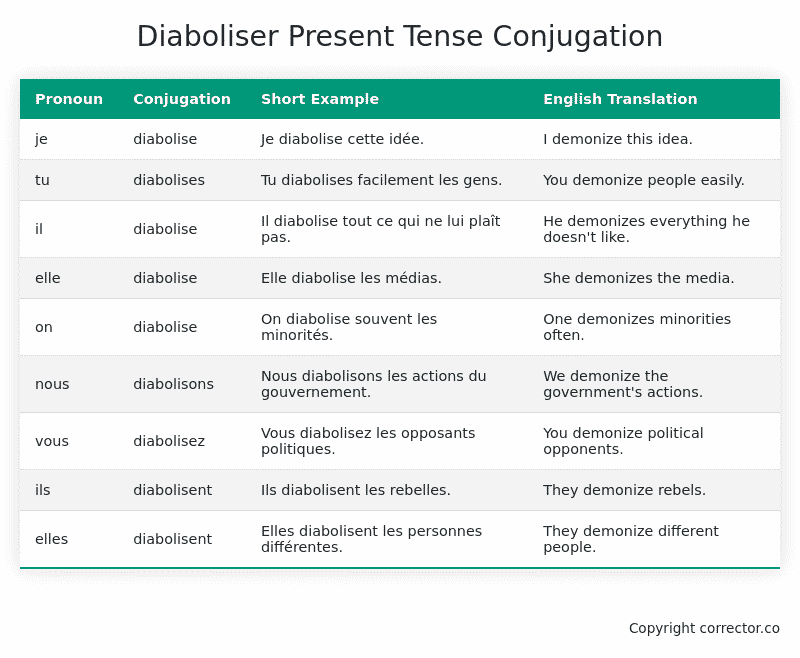Le Present (Present Tense) Conjugation of the French Verb diaboliser
Introduction to the verb diaboliser
The English translation of the French verb “diaboliser” is “to demonize.” The infinitive form is pronounced as “dee-a-bo-lee-zay.”
The word “diaboliser” derives from the noun “diable” (devil) and the suffix “-iser” (to make). It is commonly used in everyday French to describe the act of attributing evil or negative characteristics to someone or something, often in a highly critical or exaggerated manner.
Examples:
- Tu ne devrais pas diaboliser ton collègue juste à cause d’une erreur. (You shouldn’t demonize your colleague just because of one mistake.)
- Les médias ont tendance à diaboliser les immigrés. (The media tends to demonize immigrants.)
- Il ne faut pas diaboliser les nouvelles technologies ; elles peuvent aussi apporter du bien. (We shouldn’t demonize new technologies; they can also bring good.)
Note: The examples provided are for illustrative purposes only and may not cover all possible meanings and contexts of the word.
Diaboliser – About the French Present Tense
To take a deep dive into all the French tenses then see our article on Mastering French Tense Conjugation.
Common Everyday Usage Patterns For Le Present
Interactions with Other Tenses
Table of the Present Tense Conjugation of diaboliser
| Pronoun | Conjugation | Short Example | English Translation |
|---|---|---|---|
| je | diabolise | Je diabolise cette idée. | I demonize this idea. |
| tu | diabolises | Tu diabolises facilement les gens. | You demonize people easily. |
| il | diabolise | Il diabolise tout ce qui ne lui plaît pas. | He demonizes everything he doesn’t like. |
| elle | diabolise | Elle diabolise les médias. | She demonizes the media. |
| on | diabolise | On diabolise souvent les minorités. | One demonizes minorities often. |
| nous | diabolisons | Nous diabolisons les actions du gouvernement. | We demonize the government’s actions. |
| vous | diabolisez | Vous diabolisez les opposants politiques. | You demonize political opponents. |
| ils | diabolisent | Ils diabolisent les rebelles. | They demonize rebels. |
| elles | diabolisent | Elles diabolisent les personnes différentes. | They demonize different people. |
Other Conjugations for Diaboliser.
Le Present (Present Tense) Conjugation of the French Verb diaboliser (You’re reading it right now!)
Imparfait (Imperfect) Tense Conjugation of the French Verb diaboliser
Passé Simple (Simple Past) Tense Conjugation of the French Verb diaboliser
Passé Composé (Present Perfect) Tense Conjugation of the French Verb diaboliser
Futur Simple (Simple Future) Tense Conjugation of the French Verb diaboliser
Futur Proche (Near Future) Tense Conjugation of the French Verb diaboliser
Plus-que-parfait (Pluperfect) Tense Conjugation of the French Verb diaboliser
Passé Antérieur (Past Anterior) Tense Conjugation of the French Verb diaboliser
Futur Antérieur (Future Anterior) Tense Conjugation of the French Verb diaboliser
Subjonctif Présent (Subjunctive Present) Tense Conjugation of the French Verb diaboliser
Subjonctif Passé (Subjunctive Past) Tense Conjugation of the French Verb diaboliser
Subjonctif Imparfait (Subjunctive Imperfect) Tense Conjugation of the French Verb diaboliser
Subjonctif Plus-que-parfait (Subjunctive Pluperfect) Tense Conjugation of the French Verb diaboliser
Conditionnel Présent (Conditional Present) Tense Conjugation of the French Verb diaboliser
Conditionnel Passé (Conditional Past) Tense Conjugation of the French Verb diaboliser
Conditionnel Passé II (Conditional Past II) Tense Conjugation of the French Verb diaboliser
L’impératif Présent (Imperative Present) Tense Conjugation of the French Verb diaboliser
L’impératif Passé (Imperative Past) Tense Conjugation of the French Verb diaboliser
L’infinitif Présent (Infinitive Present) Tense Conjugation of the French Verb diaboliser
L’infinitif Passé (Infinitive Past) Tense Conjugation of the French Verb diaboliser
Le Participe Présent (Present Participle) Tense Conjugation of the French Verb diaboliser
Le Participe Passé (Past Participle) Tense Conjugation of the French Verb diaboliser
Struggling with French verbs or the language in general? Why not use our free French Grammar Checker – no registration required!
Get a FREE Download Study Sheet of this Conjugation 🔥
Simply right click the image below, click “save image” and get your free reference for the diaboliser present tense conjugation!

I hope you enjoyed this article on the verb diaboliser. Still in a learning mood? Check out another TOTALLY random French verb present conjugation!


